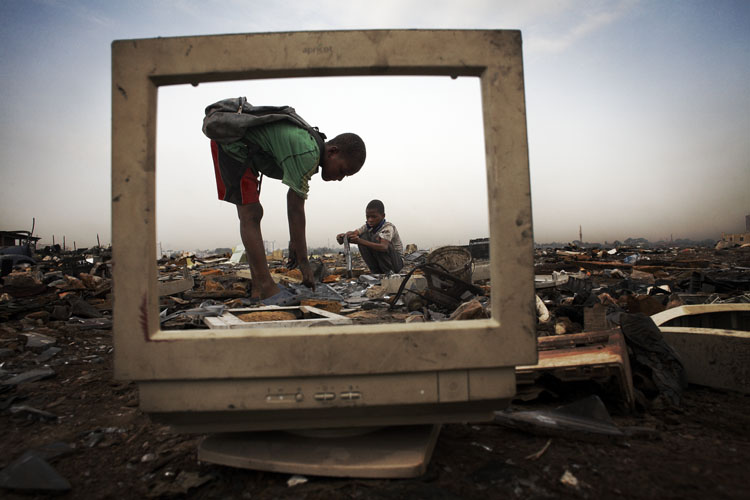
Tuesday 24th September, 2013 saw students of Kulturstudier,Ghana embark on a field trip from Cape Coast to Accra, the capital city of Ghana. As usual, the month of September/October comes with showers and minor rains across the country. It was not surprising therefore to travel the 143km journey in light rains from Cape Coast to Accra.
In Accra, our first point of stop was the Department of Geography & Resource Development of the University of Ghana-Legon. There we had a lecture with Dr. Martin Oteng-Ababio. Dr. Oteng-Ababio is an urban geographer, a lecturer, and a researcher who has conducted a number of research works on E-waste. Through his hard work, he has received a number of international awards in the last few years. After the lecture, the students appreciated the fact that he was the right person to meet on issues relating to e-waste.
There was a second lecture with Mr. Joseph Edmond at the Environmental Protection Agency (EPA) of Ghana. Mr Edmond is the Deputy Director of the Chemical Control Department of the EPA. A number of interesting information was gathered by the students from Mr. Edmond. Surprisingly, although a number of concerns have been raised on E-waste in Ghana, a bill on E-waste is yet to be approved by the Ghanaian parliament. Shortly after this lecture, we set off for Agbogbloshie.

At Agbogbloshie, we were amazed at what we saw. Men, women and children most of whom have migrated from the northern part of the country and settled here were actively involved in one activity or the other relating to E-waste. The activities here are hierarchically-structured. There is a chairman who is in charge of everything, the middlemen, dismantlers, collectors and burners all in the hierarchy. Earnings vary according to this hierarchy but according to Dr. Martin Oteng-Ababio,this is not always the case. In groups of 4 and 5 with a translator for each group, the students interacted and interviewed with the people of Agbogbloshie and gathered relevant information from them. Although there were minor rains almost the whole day, this never stopped the people from carrying out their activities. The students also eager to learn about e-waste and the community at large did same without being stopped by the showers.
At about 17:30 GMT, we left Agbogbloshie. There was a 30 minute shopping time from 18:00-18:30 at SHOPRITE on the Accra-Cape Coast highway. At 21:43, we were at the hostel but 45 minutes later than scheduled because of traffic problems in Accra.
Evans
Photos by:
Andrew McConnel, Emil Nordander & Evans McNelly



I feel ashamed aynitme i read about Agbogloshie.I think to start, there must be a clear policy on e-waste( a policy that will be implemented) concerning the importation and use use of electronics. The source of e-waste is from the developed countries who ship volumes od used or near-expiring electronics to Ghana.These consumers are told they have been tested and contain no hazardous substances.There must be the Implemetation of the Rotterdam Convention to involve the exporting countries and the Importing country.Since Ghana hasn’t got the means to check on the hazardous situations of these, the exporting countries must be held responsible for the export of these into Ghana and other developing countries. Within the country, the so-called repairers must be registered into a cooperative so that the e-waste can easily be collected to a central point where an e-cycler could handle them.On the part of those who are involved in this business, there must be an alternate source of income through skills training to discourage the trade.